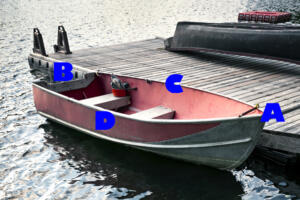 Have you ever been in a boat with an operator that seemed a bit reckless and/or ignorant of seemingly obvious safety issues?
Have you ever been in a boat with an operator that seemed a bit reckless and/or ignorant of seemingly obvious safety issues?
Has anyone ever admitted to you that they have a boating license but that their spouse, child or friend took the online test for them?
If so, you will be interested to know there are a variety of ways to educate yourself and others on common boat terminology, regulations and restrictions.
When it comes to water sports you can never be too careful so share your knowledge with anyone operating a boat.
State Boating License Requirements
Most states require boat operators to obtain a boating license prior to driving in the water.
Obtaining a state license requires you to pass a written or online test.
Although state regulations may differ slightly there are numerous requirements that are the same across the country from lakes to oceans and rivers.
There are only eight states that do not require a boating license in the United States. America’s Boating Course has the full list showing which states require and which do not require a boating license.
Vessel Versus Boats and Ships
Vessel is a catch all term for all types of floating devices designed to carry people or goods. Larger boats and ships are usually referred to as vessels more often than smaller boats.
Boats are small vessels propelled by oars, sails, or engines.
Ships are large vessels that usually carry boats as a safety measure.
What Boats Need Registered
Small non-powered boats such as canoes and kayaks do not require a boating license.
Sailboats, personal watercraft (PWC) and power boat regulations differ state to state depending on the engines horsepower and/or the size of the boat.
Basic Terminology
Make sure to know these common terms for boats prior to taking the drivers seat.
A. Bow – front of the boat
B. Stern – rear of the boat
C. Port – the left side of the boat when onboard and facing bow
D. Starboard – the right side of the boat when onboard and facing the bow
Hull – main body of the boat (i.e. bottom, sides and deck)
These terms are just the beginning of the detailed information on regulations you will need to know to pass your test.
Other important terms include certain lights and other items that help one to pinpoint the direction and location of your boat in the water.
Age Variations
Alabama requires that all operators 12 and over pass a boating license test unless they were born prior to April 28, 1954. Those born prior to this date need a vessels license but are exempt from taking the test.
Other states only require vessels license for those under the age of 16.
The minimum age that can obtain a license in a lot of states is 12 but others are 14.
The United States Coast Guard (USCG) has a detailed listing of age restrictions, personal flotation device requirements, minimum passing scores and more useful information broken down by state.
Approved Online Test
The USCG link above provides information regarding which states allow and which do not allow online testing. All of the states reviewed for this article, Lake Homes Realty states, allow online testing.
This link also provides a lost of several boating courses and tests boat operators must take.
Cost of Courses and Tests
Most states require an online course be taken prior to taking the test. Boater-ed.com offers online courses with the final exam at the end.
Pricing for the course and test in Texas is $20 whereas pricing in most of the Southeastern states is $29.50.
Boater Exam also offers courses by state and the online test for around the same pricing.
Renewal Periods
The majority of states have no expiration date for boating license certificates.
Texas boating license are only valid for a year and Minnesota boating licenses expire at the age of 18 when the license is no longer required.
Boating License 101 Extra Prep
For the overachievers, Boater Exam has 134 videos on YouTube that detail all of the information you will need to take a boating license exam and be safe operating your boat or PWC.
Why Boating Regulations Matter
For your safety and the safety of those around you the knowledge of boating regulations, standards, requirements and terminology is priceless.
Knowing boating laws makes you all the wiser and more prepared for any adventure you may encounter even when your state does not require you to obtain a license.

